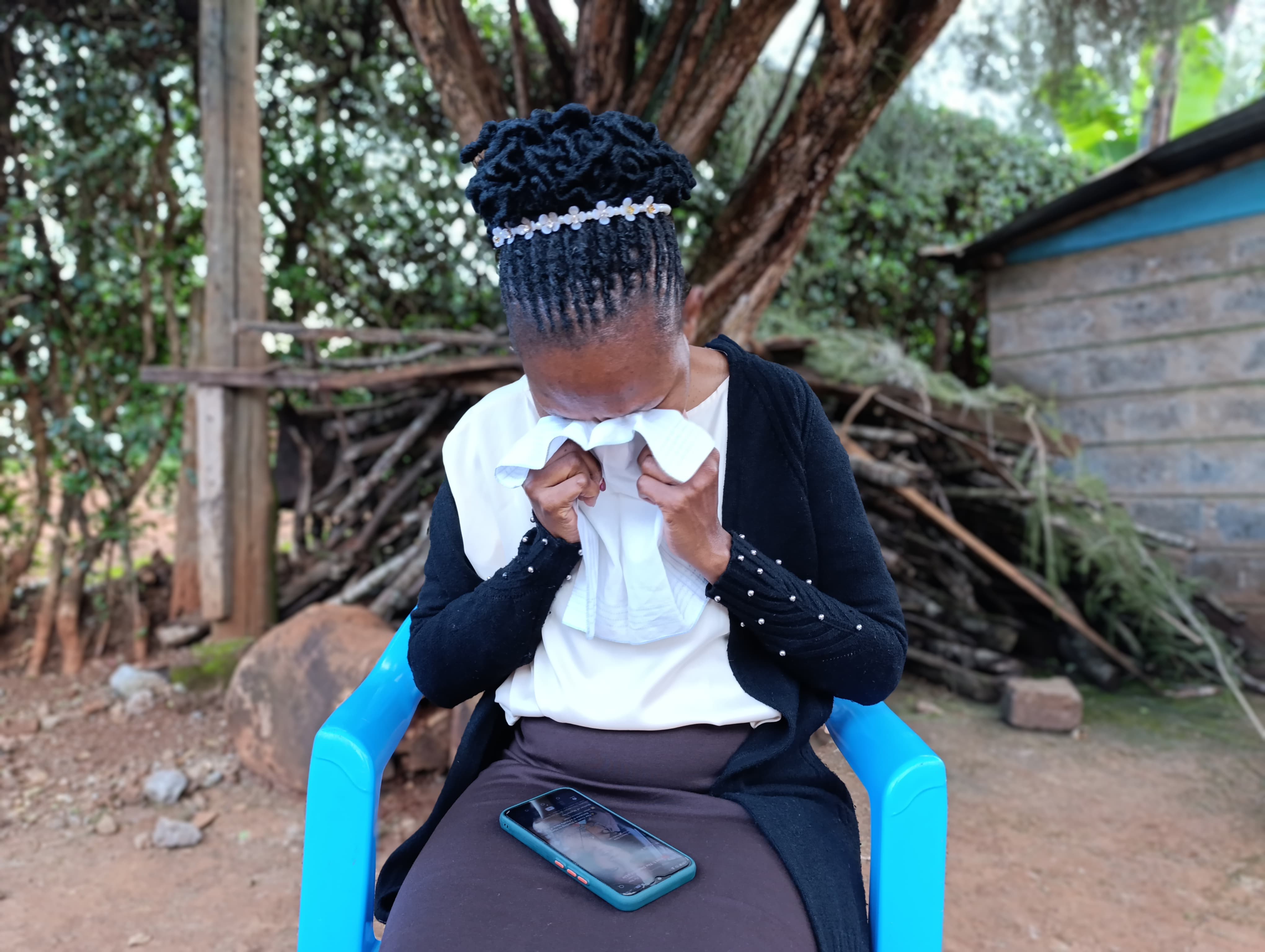- The discussion centered on creating a standardized tool to track and monitor community mental health, enhancing care for maternal patients through better evaluation and targeted support.
The maternity wing at Matata Nursing Home is filled with joy, warm congratulations. You can hear people laughing and unwrapping gifts. But that is not the same case with Lyn.
Lyn is on her bed, alone with an untold experience, a silent battle of pain and exhaustion, relief washes over her because she made it through labor after hours of pushing and screaming.
Beneath the surface of her loosely tied gown, her worn out body aches, her cervix torn and stretched from the journey of birth, her uterus cramping from the flash out and most agonizingly, her baby dead.
In her head she sees the images of her dead son being held by its two legs by the nurse trying to resuscitate him and patting its back replaying in her head as she gets more overwhelmed.
“The only thing I remember was my nurse breaking the news that my baby boy did not make it, I was shattered, I was alone, emotionally scarred, but that was the beginning of my mental toll,” Lyn sorrowfully recalls.
Read More
In her shaky voice, Lyn remembers how her depression worsened after the loss, the guilt draining her and keeping her awake every night.
“After discharge, I learned my baby was put in a carton box and dumped in the hospital waste pit,” She explains, adding “I never got closure and I have never healed from that, I do not have a grave yard for my son.”
According to Lyn she never got any mental support from the hospital, even the nurses in charge of her wellbeing never offered any mental support to enable her cope with her loss.
“All I received were pity apologies. No mental checkups, and going home empty-handed made me feel like there was no point in living. I just wanted to be with my baby,” Lyn says as she fights back her tears.
In her dark days she spent looking through her baby’s stuff picturing how her baby would look good in the clothes but a time came for her to give away the only part of her son she held close.
“Giving away everything I bought was a reminder that I left the hospital empty handed. I was emotional but I could not share my pain with anyone because nobody would understand me.” She takes a deep breath and wipes her tears.
To keep her mind occupied Lyn terminated her maternal leave to get herself engaged at work. It took her a long time to recollect herself and move past her loss.
“Four months later I called in at work to terminate my maternity leave because I felt undeserving of post-partum care since I did not have a baby, going back to my empty house brought back the pain,” Lyn adds.
Reflecting on the days when she struggled to overcome her loss, Lyn noted that some of the experiences she felt included persistent sadness, guilt, feeling irritated and worthless.
“I went from a joyful mom-to-be to feeling worthless the moment I left the hospital without my baby. I was constantly overwhelmed, my depression was visible even though I denied it,” she says as she closes her eyes for a moment, as if trying to push away the memories.
There came a time when Lyn did not want anyone at her house. She pulled away from her social life because every visit only reopened her of the fresh wounds.
“Nothing they said made a difference. I felt irritated each time someone asked how I was doing, it was a question I couldn’t answer without breaking,” Lyn shares.
A Psychologist’s Perspective on Grief and Depression
Most mothers drown into depression because there is no emotional support from family and friends, as many times people only check on the child but not the mother, affirms Dr. Venus Kyengo a Counseling Psychologist at Myndspa Mental Health Clinic.

“The lack of emotional support severely affects a mother's well-being, leading to feelings of rejection or, in extreme cases, harming her child, as she is unable to transfer love when she isn't receiving it herself,” Dr. Kyengo affirms.
Dr. Kyengo explains that trauma and denial contribute to depression in mothers of stillborn babies, making them more vulnerable to suicide due to emotional triggers from their loss.
“When a mother loses her child she is more exposed to depression because of shock and trauma. I had a miscarriage and as a mental health expert it took me one year to overcome depression,” Dr. Kyengo shares her experience.
Early detection and treatment of postpartum depression, through awareness and recognizing symptoms, can help mothers access the right mental support and reduce the risk of long-term depression.
“Post- Partum Depression (PPD) is treatable with therapy, hormonal support, and emotional care. Self-awareness is key—recognizing signs like guilt, low self-esteem, and worthlessness helps mothers seek early treatment and avoid long-term effects,” she adds.
Dr. Kyengo encourages women to invest in their mental health, get psycho-education to empower them to recognize symptoms, seek help and navigate thoughts of psychological harm.
The WHO guide for integration of perinatal mental health in maternal and child health services noted that in many hospitals, maternal care primarily focuses on health while little or no attention is given to mental wellbeing of the mother.
After delivery instructions on breastfeeding and post natal care appointments are prescribed but mothers are rarely screened for depression during and even in post-partum periods.
Statistics by Word Health Organization shows that 1 in 5 women experience mental health condition during pregnancy or in the year after birth and this is contributed by lack of mental health experts in Maternal and Child Health (MCH) to flag early signs of depression.
In the efforts towards addressing PPD, the Ministry of Health in June 2023 initiated the integration of maternal mental health services into maternal care; however, this initiative still faces challenges that hinder its full implementation.
The challenges include lack of job aids and practical strategies to equip healthcare providers with adequate resources for addressing maternal mental health and delivering holistic care.
The discussion centered on creating a standardized tool to track and monitor community mental health, enhancing care for maternal patients through better evaluation and targeted support.
Spotting the Signs
Dr Julius Ondigo a gynecologist at the Homa Bay Teaching and Referral Hospital acknowledges that spotting early signs of PPD during the antenatal visits has been manageable due to the comprehensive checkups on their physical health but also mental health.
“During antenatal clinics, we assess mood, interest in the pregnancy, fatigue, anxiety, and concentration to detect early signs of depression, as post-delivery cases often escalate into full-blown PPD, which is more severe than postpartum blues,” Dr. Ondigo says.
He affirms that trauma from stillbirth, combined with existing mood disorders, intensifies grief and puts mothers at high risk of developing full-blown postpartum depression.
“In cases of stillbirth, where trauma is accompanied by grief and mood disorders, the mother requires consistent close monitoring and counselling as the emotional toll can be just as devastating as the physical recovery,” Dr Ondigo says.
PPD is majorly caused by hormonal changes that begin upon conception and goes all the way to twelve months post-delivery that affects the general mood of the mother.
“Oxytocin and adrenaline are released in high levels during birth alongside estrogen and progesterone which plays a crucial role in labor and childbirth, these in turn causes mood disorders and anxiety that promote PPD,” noted the gynecologist.
In cases of full blown PPD in the rural areas, the peer counselors in those clinics refer their patients to the referral in Homa Bay for further mental and psychological support.
Reflecting on Lyn’s darkest days, the presence of friends and visitors only deepened her pain. Each well-meaning face and each word of sympathy, was a reminder of the baby she would never hold again.
Their remorse, though heartfelt, couldn’t fill the hollow ache inside her. So, she withdrew, choosing silence over small talk, isolation over empty comfort as she quietly drowned in the weight of her grief.
Lyn also reiterates that if the hospital had offered mental support, it would have helped her overcome her loss faster as coping mechanisms would have made things easier.










